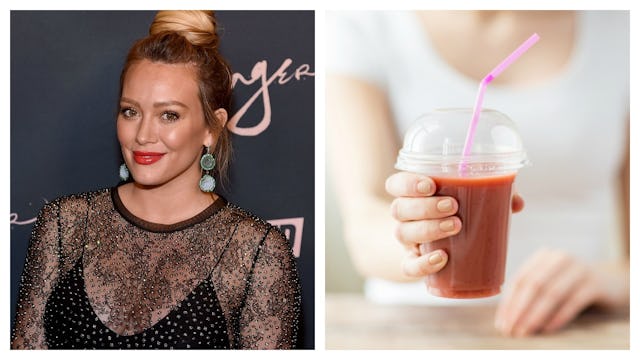Hilary Duff Is The Latest Celebrity To Eat Her Placenta

Most of us love fruit smoothies. But would you ever use it as a method to eat your placenta?
Maternal placentophagy, which is most often referred to in the simple terms of eating the placenta shortly after birth is a huge topic of conversation in the worlds of medicine and pop culture. People have feelings, big feelings, about it.
Last Thursday, Hilary Duff got the”is it ok to eat your placenta” debate started again when she revealed her decision to not only ingest her placenta in smoothie form but to have it preserved into ice cubes for further use.
“I haven’t had a smoothie that delightful since I was, like, 10 years old. It was calorie-filled with juice and fruit and everything delicious,” the recent mom of two explained. “It was good. I was a little wigged out at first, to be honest.”
Duff is far from the first celebrity to get this conversation rolling, but she is the most recent. Other celebs who have made similar decisions include, Tamera Mowry, Mayim Bialik, and Alicia Silverstone who had her placenta encapsulated. And chances are at least one mom you know has given it a go too.
First things first, let’s address the issue of why someone would want to ingest their placenta. Well, since the placenta is packed full of iron and vitamins B6 and B12, new moms want the vitamins. Some also theorize that the presence of estrogen and progesterone in the placenta, which drop after giving birth, could be helpful for fighting off postpartum depression and other postpartum mood conditions. So basically, supporters see it like a preventative superfood.
And despite it being seen as “weird,” some point to the animal kingdom as proof that it’s natural.
If you do decide you want the magical goodness of your placenta, there are several ways to ingest it. The most common way is to have it dehydrated and put into pills. Some, like Duff, have it put into smoothies or ice cubes, others have it ground up into powder, and if you search long enough I’m sure we can find accounts of people who cook it and eat it whole. Yes, really.
But what does the medical community say? Well, like most things, it depends on who you ask.
In 2017, the Center for Disease Control and Prevention released a report saying there is no official protocol for processing the placenta for ingestion. They cited a woman in Oregon who passed a serious infection to her child after having her contaminated placenta encapsulated. Consequently, the baby developed group B Streptococcus agalactiae (GBS) and required two separate hospital stays. The CDC noted the possibility relatives had transmitted the condition to the new baby. But when tested, the placenta samples provided tested positives for GBS as well.
A research team from Northwestern University concluded there was no proof eating the placenta helped fight off postpartum depression, ease pain, boost energy or aid lactation. They also noted that there are a lot of unknown risks involved in how it can impact mom and baby. And much of the spike was impacted by celebrities trends.
However, earlier this year, the University of Nevada, Las Vegas and Oregon State University collaborated on a studythat aimed to re-examine the risks of placenta ingestion and was published in the medical journal Birth. After reviewing 23,000 birth records, they checked for an increase in three areas: Neonatal Intensive Care Unit admissions in the first six weeks of life; neonatal hospitalization in the first six weeks; and neonatal/infant death in the first six weeks. Seeing no connection, they concluded that maternal placenta consumption causes no harm to newborns.
While the study found maternal placentophagy has no negative impact on baby, they didn’t look into the wide range of mental health benefits that have women rushing to eat their placentas in the first place.
Not surprisingly, it seems placenta consumption seems like another area where natural medicine and modern medicine face off. Still, many mothers swear by the benefits of eating the placenta and like many other homeopathic decisions, it’s not likely to go anywhere soon.
Before ingesting your placenta in any form, however, you should do three things.: (1) talk to your medical provider; (2) research the most recent medical information and peer-reviewed scientific studies on the subject; and (3) decide if you are comfortable dealing with any potential negative consequences. Just because it worked for your friend, doesn’t mean it will work for you, and vice-versa.
If you do decide to eat your placenta, make sure it’s processed by a professional. And whatever you do, don’t ever trust celebrities opinions as medical sources.
This article was originally published on